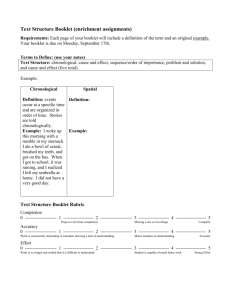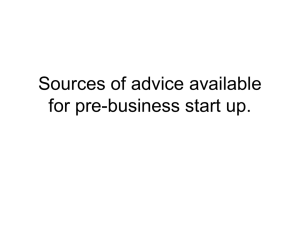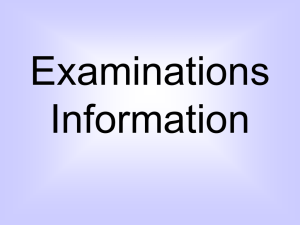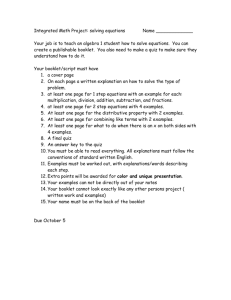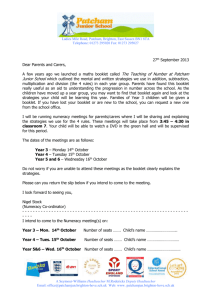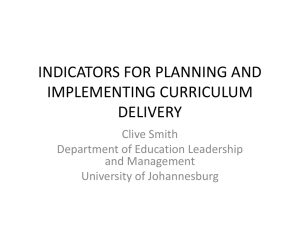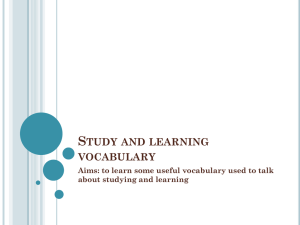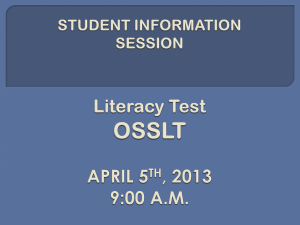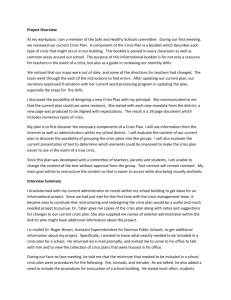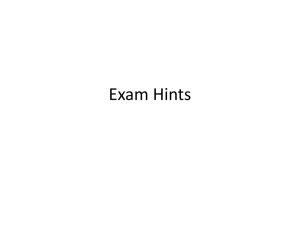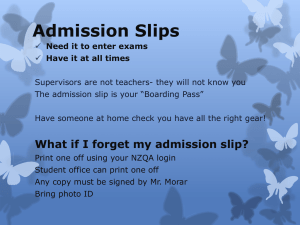HOH/Tutor meeting Agenda for 12 March, 2007
advertisement
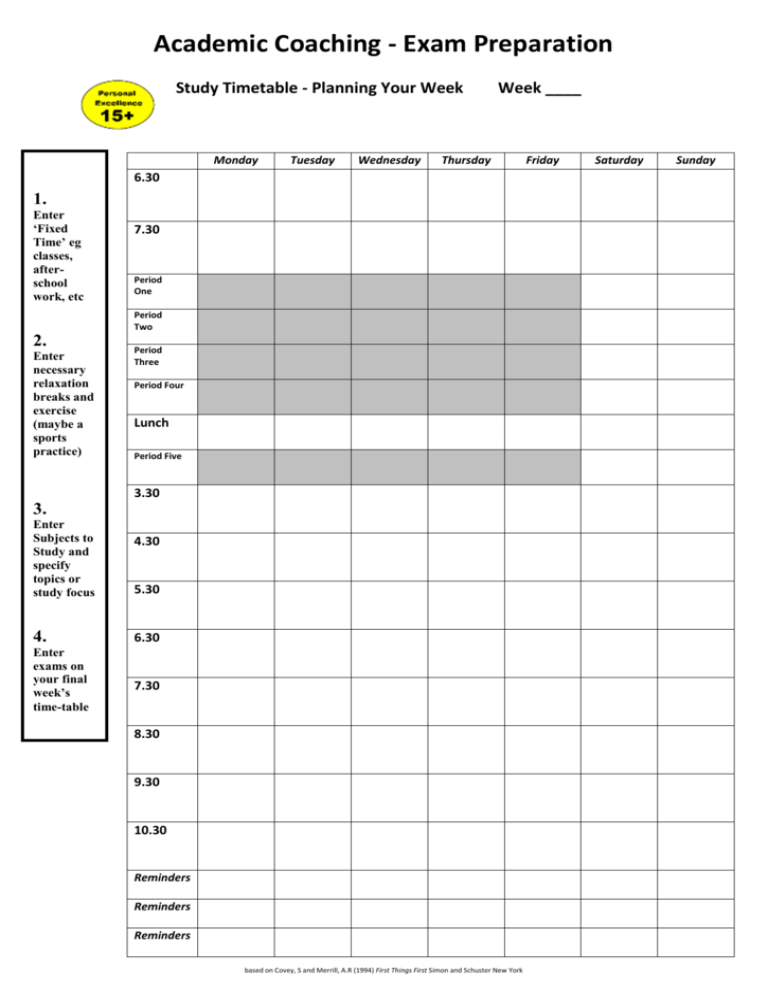
Academic Coaching - Exam Preparation Study Timetable - Planning Your Week Monday Tuesday Wednesday Week ____ Thursday 6.30 1. Enter ‘Fixed Time’ eg classes, afterschool work, etc 7.30 Period One Period Two 2. Enter necessary relaxation breaks and exercise (maybe a sports practice) Period Three Period Four Lunch Period Five 3.30 3. Enter Subjects to Study and specify topics or study focus 4. Enter exams on your final week’s time-table 4.30 5.30 6.30 7.30 8.30 9.30 10.30 Reminders Reminders Reminders based on Covey, S and Merrill, A.R (1994) First Things First Simon and Schuster New York Friday Saturday Sunday To Prepare Complete What works best for me to keep me focused is: Realistic ‘Study Timetable’ For Me Sitting at a desk/table Lying on the floor Listening to music Making lists I know ‘What Will Be In My Exam’ I work best in the ________________ (time of day) I work best in the ________________________(part of the house or place) I’ll cut out distractions by _________________________________________ Having the room warm Having the room cold Natural sunlight Having a window open Having a study journal Making a study card Creating a reward for the end of the session Having my parents check on me The best study food for me is _______________________________________ because it keeps me alert and I can concentrate longer Subject Study Buddy Tutoring Teacher Confidence 1-no, 2-kind of, 3-yes Seen a sample exam Practised exam questions Had the teacher mark my practice answers (These can be practised numerous times!) Useful websites: Where you can find details on your subjects and even PAST EXAM PAPERS http://www.nzqa.govt.nz/qualifications-standards/qualifications/ncea/subjects Easy access info for certain subjects and even some games http://www.studyit.org.nz Keep hydrated Eat nutrient rich foods Keep good sleep routines Balance study with your stress releases My end of year exam date is What Will Be In My Exam You will need to break this down for each paper Have you got the right stuff in the boat before you set sail? Subject ___________________ Standard title: _______________________________________________ Standard title: ________________________________________________ Standard number (e.g. 1.2) ______ Standard number (e.g. 1.2) ______ What is supplied in the exam: Booklet to read Booklet to write in Booklet to read + write in Credits for this paper ____ A computer What is supplied in the exam: Booklet to read Booklet to write in Booklet to read + write in Credits for this paper ______ A computer Are there any special instructions? (e.g. Answer one question from each section) Are there any special instructions? (e.g. Answer one question from each section) ____________________________________________________________ _____________________________________________________________ * The questions will be about / I’ll be required to: ____________________________________________________________ ____________________________________________________________ ____________________________________________________________ ____________________________________________________________ * The questions will be about / I’ll be required to: _____________________________________________________________ _____________________________________________________________ _____________________________________________________________ _____________________________________________________________ Other stuff I need to remember: ____________________________________________________________ ____________________________________________________________ ____________________________________________________________ ____________________________________________________________ Other stuff I need to remember: _____________________________________________________________ _____________________________________________________________ _____________________________________________________________ _____________________________________________________________ What I’ll need to bring: Pens Colour pencils Refill paper Text book Ruler What I’ll need to bring: Pens Colour pencils Refill paper Text book Ruler Eraser HB pencil Calculator Compass Protractor Other: Eraser HB pencil Calculator Compass Protractor Other: EXAM PREPARATION – SUCCESS MADE EASY A What do I need to know? It might seem like an obvious question, but you'd be surprised how many people start studying without having a clear idea of what they want to achieve at the end of it. Don't study just for the sake of it! Know what you need to know, and aim towards it. Read the course description for each subject carefully. What are you required to know? What will you be examined on? What will you not be examined on? Go through past exam papers. Ask your teachers to get you copies if they haven't already. Copies of past exam papers are available from the NZQA website. Find out if this year's exam is going to be similar - will there be the same number of questions? Are there any major changes of format or content planned for this year? Write a brief list of the major topic areas you need to cover for each subject. Discuss with your teacher which exam questions or options you should choose to study for and how you'll decide what questions to answer in the exam. This will be useful for planning a detailed study schedule and to make sure you've covered everything you need to. Look at how you have done in your own school exams. B Where and how should I study? Find a comfortable place to study. If noise disturbs you, find somewhere quiet. Make sure everything you need is there - stationery, good light, fresh air. Log out of Facebook etc. Turn off your phone. Use Facebook and phone time as a reward for when you have completed your goal for the session. The messages will still be there when you check them later. Plan to take regular breaks. No-one can work effectively for hours without a break. Take five or ten minutes every hour to get some fresh air, a snack or something to drink. Set yourself goals for each session and tick them off as you achieve them. That way, you'll really feel like you're making progress. C What's the best way to take notes? Writing and rewriting information down in note form is one of the best ways of learning and remembering information. After you have read a section, just ask yourself what key ideas it contained. There are all sorts of ways to take notes - use a note-taking technique that suits you. How do you like to take notes? By drawing diagrams? By using different coloured pens? By highlighting key words? There is no one way to take good notes - the important thing is that they make sense to YOU. D What if I'm having trouble understanding a subject? Studying is not always easy. Don't be afraid to ask for help. Your parents and your teachers all want you to do well. Use websites such as www.studyit.org.nz www.nzqa.govt.nz www.khanacademy.com Google the topic or enter it into the search engine for Youtube. What about your friends? Studying with someone else can often be helpful for both people, and it makes a nice change from working on your own - just make sure you don't get distracted from the task at hand. A 'buddy system' can also be helpful on the day, making sure you both get to the exam room in time and reminding each other to bring admission slips. E Sitting Exams No matter how good you were in sticking to your study plan and covering all the material, you're going to be nervous when the day of the exam finally arrives. This is perfectly normal- in fact, just like any performer, it's good to be a bit hyped up when you go in. But don't get too stressed out. Minimise your stress levels. Get up in plenty of time. Eat a light, healthy breakfast. Check you have everything you need for the exam and leave behind anything you don’t need – remember you are not allowed to have cellphones or other electronic devices. Arrive at the exam venue with time to spare. Team up with a buddy who can provide some friendly support. Once you are in the exam room: Listen carefully to the supervisor's instructions Get out everything you need Read the instructions on the paper carefully Read over the entire exam first and decide which questions you are going to answer, where you have options Determine your approach to the paper, based on your preparations and previous discussions with your subject teacher. Which questions will you answer first? Work out how much time you have for each question Always attempt all the required questions - any answer is better than no answer at all. If you have to write an essay, make a brief essay plan Try to leave some time at the end of the exam to read over your answers. F More Study Tips 1 Four ways of making it easy to start study: Make yourself an inviting work environment. List the tasks to do beforehand. Keep the benefits of study clearly in mind. Leave your study area inviting for the next time. 2. Make study fun: Use your best time of day. Use the chocolate box approach by keeping study periods to bite-sized chunks, and by giving yourself variety. 3. Study with your main purpose in mind. 4. Supply the salami principle: regular small slices of study will add up to big 5. Complete your projects. 6. File and tidy up at the end of your study periods. 7. Reward yourself for each completed study period. achievements. 8. Reading is a key study skill. Use the four pronged approach: Preparation (browsing) Overview The closer reading Review 9. Make notes. These are personal and should be as short as is needed by you for your purpose. Why are you making notes? Note-making is an active process There are several types of notes: Underlining and highlighting of text in the book Linear and hierarchical lists (like this summary) Spider diagrams 10. Many find it helpful to condense notes at repeated revisions. 11. Work with the information. Practice skills (such as drawing, doing calculations, or speaking German). Draw a diagram to represent the information. Explain your subject to someone else. Relate what you have learned to other things you know. 12. The multimedia approach: make use of several "modalities:' Write. Speak. Dictate audio tapes. Listen to tapes or radio. Watch video or TV. Use colour in your diagrams. 13. Give yourself a boost: a little and often. Carry a notebook and look at it at odd moments. Make up a MP3 study guide and listen to it when travelling? 14. Use a revision strategy if studying for an exam: Rehearsal Timetable Include a revision of the revision Build in slack Practice Reward yourself after the exam 15. Examination nerves are normal. Learn how to manage them. Prepare yourself for whatever the future brings. Student Name: ___________________________ Evaluation of exam results Subject Goal set Exam preparation and exam technique: What worked well What didn’t work well What needs to be improved for the next exams Results from the exam
